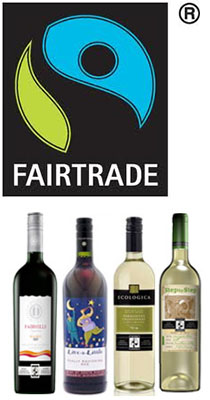 Disadvantaged producers get a better deal through the Fairtrade system, this is why it was set up. These producers are awarded an independent certification by means of the Fairtrade Mark as a guarantee.
Disadvantaged producers get a better deal through the Fairtrade system, this is why it was set up. These producers are awarded an independent certification by means of the Fairtrade Mark as a guarantee.
Fairtrade came into being in 1988 in Holland after the collapse of the world coffee price. As prices tumbled many coffee farmers were not able to cover their costs of production and they, and their families suffered severe hardship. A 'fair' system had to be introduced, and so the Fairtrade Foundation came into being.
It wasn't long before many other forms of agriculture were encompassed into the Fairtrade format. Why did that happen? Well, most farming operations from coffee and bananas to flowers and grapes were receiving an income well below the cost of production. This could not be allowed to continue so what Fairtrade has ensured is that producers will get a reasonable income for their product.
The first Fairtrade winery in the world to be accredited with the certification mark was Thandi in South Africa. But in those early days were the wines up to world standard, I guess not - but recently there has been a remarkable revolution with much more co-operation and understanding between producers and workers. Not only are the wines well made and full of character, they are also able to compete on price and quality with other leading wines on the supermarket shelves.
It must be remembered that many of the world's grape growers and pickers still live on the poverty line, but thanks to Fairtrade this is now being addressed. Next time you sip your glass of wine and get that feel-good factor, don't forget that a great deal of 'cheap' labour may have been used in the vineyards at harvest time to pick those grapes. Now we can rest assured that many of the hard working pickers will at least be getting a decent recompense for their hard toil. Why should large corporations make millions on the back of sweat labour, it's not right.
So how is the Fairtrade price calculated?
The minimum price for the product is calculated to cover costs of sustainable production, this also takes into account a sustainable livelihood. Traders and producers are involved in the price-setting process - it's a sort of mini co-op!
With the devastating impacts of the global recession and the credit crunch, producers need Fairtrade now more than ever. Rob Cameron, CEO of Fairtrade Labelling Organizations International.
Fairtrade is helping to ensure that exploitation of vulnerable workers is tackled as everyone is entitled to a fair wage for a fair days work, and more and more of us are recognizing this. So keep a look out for the Fairtrade logo next time you search for wine in the shops or online - you too can help in Fairtrade.
To find out more about wine, have a look at Understanding Wine.
Article Source: Fairtrade Wine - What's it All About?
By Rob Hemphill
FairTradeWine
How fine is Fairtrade wine?

